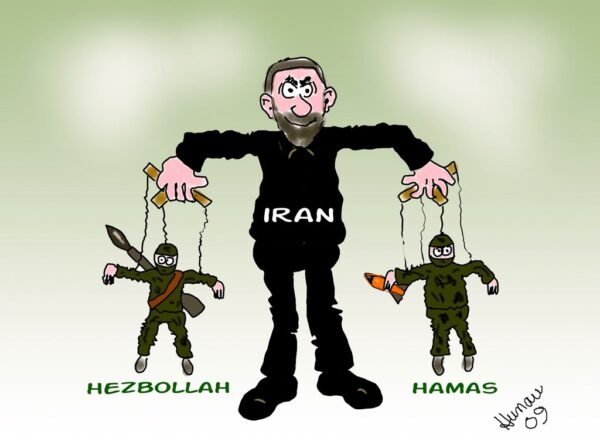By : Ya Libnan Editorial Board
Recent reports have surfaced that Hezbollah, the powerful Lebanese militant group, urged Iran to launch an attack against Israel as the fighting between Hezbollah and the Israeli military escalated. However, despite these calls, Iran has notably refrained from direct intervention. This hesitation raises a critical question: Is Iran fearful of Israel’s military capabilities, or is it gradually distancing itself from its allies, like Hezbollah, much as it appears to have done with Hamas in Gaza?
Iran’s Strategic Calculus
Iran has long prided itself on being a staunch supporter of anti-Israeli movements in the region. For decades, Hezbollah has been the crown jewel of Iran’s regional proxy network, seen as a formidable deterrent against Israeli military action in Lebanon. Likewise, Hamas has enjoyed significant financial and logistical support from Tehran in its fight against Israel.
But the recent conflicts have highlighted cracks in Iran’s commitment to these groups. While Hezbollah wages a dangerous and escalating battle with Israel, Iran remains conspicuously on the sidelines. Similarly, during the recent war in Gaza, Iran’s support for Hamas was largely rhetorical, with little tangible involvement in the conflict itself. Could this be a sign of strategic recalibration in Tehran’s approach to the region?
Fear or Realpolitik?
One possibility is that Iran is reluctant to engage directly with Israel out of fear of a broader military conflict. Israel possesses advanced military capabilities, including air superiority, cutting-edge technology, and one of the most sophisticated intelligence networks in the world. Moreover, the possibility of U.S. involvement in any military engagement is a constant threat that Iran cannot overlook.
With its economy still reeling from international sanctions, internal unrest growing, and the financial drain of its involvement in Syria, Iran may not be in a position to risk an all-out war with Israel. In this context, Iran may be choosing to preserve its resources for domestic stability rather than risk a confrontation that could further weaken the regime.
A Shift Away From Hezbollah and Hamas?
Another possible explanation is that Iran is reassessing its relationships with Hezbollah and Hamas, and even the broader “Axis of Resistance” it has built. Supporting proxy groups is costly, both financially and politically. The international backlash following the attacks by Hamas on Israel and the subsequent bombardment of Gaza has added to Iran’s isolation.
There’s also the possibility that Iran no longer sees Hezbollah and Hamas as essential in its long-term strategic goals. With shifting dynamics in the region — from the Abraham Accords to the growing Arab-Israeli normalization — Iran may be finding its traditional approach of supporting militias and proxy wars less effective in the face of these new alliances. In Gaza, Iran’s hands-off approach could be seen as Tehran pivoting away from direct involvement in conflicts that no longer serve its interests.
Abandoning Hezbollah: What Does This Mean for Lebanon’s Shiites?
Hezbollah is not just a militant organization; it has long positioned itself as the protector of Lebanon’s Shiite population, with deep-rooted ties to Iran, the leader of the global Shiite community. Any perceived abandonment of Hezbollah by Iran would, therefore, raise an existential question for Lebanon’s Shiites: Can they continue to rely on Iran for support, or must they now turn inward to focus on their Lebanese identity?
Iran’s influence on Hezbollah has allowed Tehran to extend its geopolitical reach in Lebanon for decades. However, if Iran chooses to distance itself from Hezbollah, this could deeply unsettle the Shiite community, which views Iran as the spiritual and political leader of the Shiite world. For many Lebanese Shiites, Hezbollah has been more than a military group—it has been a political lifeline, offering representation and services that the Lebanese state often fails to provide.
Shifting Loyalties: Toward a Lebanese Identity?
Iran’s reduced role in Lebanon could present an opportunity for the country’s Shiites to reflect on their future, especially in light of Lebanon’s prolonged political crisis. The nation has been without a president for nearly two years, with Hezbollah playing a significant role in the political deadlock. Should Iran’s grip on Hezbollah loosen, will the Shiites of Lebanon begin to rethink their role in Lebanon’s fractured political landscape?
Without the constant pull of Iranian influence, Lebanon’s Shiites may shift their focus from external loyalties to internal stability. They could prioritize their Lebanese identity over their sectarian ties to Iran, potentially playing a crucial role in breaking the political impasse. This could open the door to a more inclusive national dialogue that allows Lebanon to finally elect a new president and begin addressing the economic and political crises that have paralyzed the country.
If Lebanon’s Shiites begin to distance themselves from Hezbollah’s hardline politics and instead invest in rebuilding their country, this could signal a profound transformation for both Lebanon and the wider region.


Leave a Reply
You must be logged in to post a comment.